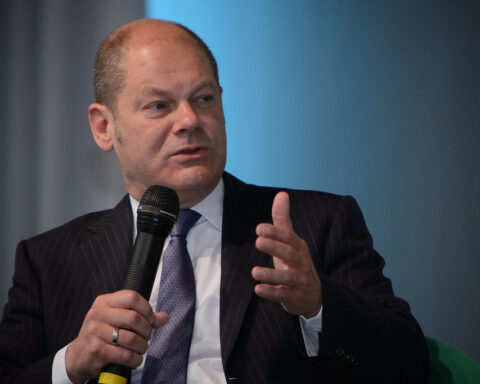Winters in Berlin are notoriously tough but this year has been like no other. “I’m really tired of it,” Ina Eggers, a teacher in the city, says. “Winter is always hard but now [with lockdown] we don’t have anything to do, so it’s been awful. ”
Germany is in the midst of a third wave of the pandemic, with case numbers increasing rapidly. On Saturday, the Robert Koch Institute reported 16,033 new Covid-19 infections within one day – 3,359 more than a week ago. In light of this, doctors are calling for an urgent tightening of lockdown rules to prevent hospitals from becoming overwhelmed for the third time.
On Monday, German politicians had planned to discuss the next steps for easing out of an almost five-month partial shutdown which began on 2 November and has been tweaked several times since. It’s now expected they will tighten and extend the restrictions instead.
“People are tired, exhausted, and weary of it all,” says Trent Murray, a reporter in Berlin. “The rolling extension of [Germany’s lockdown] has given the perception that it won’t ever end. I was excited thinking I could meet friends for a coffee soon, but now the [infection] numbers have gone up and it’s disheartening.”
Defne Cicek, 20, a student from Düsseldorf, is also frustrated. “For me, it feels like we’re going round in circles,” she says. “The future feels more uncertain than ever and it feels like we will never be able to go back to ‘normal’.”
Many have grown frustrated with Germany’s sluggish vaccine rollout, with just 8.69% of the population having received a first jab by Saturday. The latest issue of Spiegel magazine even laments “the new German incompetence” in regards to the slow pace. “Why are other countries faster?” the magazine asks.
“I personally feel let down by the government,” Cicek says. “It’s been way too slow compared with other countries.”
The pace has taken Murray, who is originally from Australia, by surprise. “I looked to Germany as having a strong sense of organisation and productivity,” he says. “So it’s surprised me to see [the vaccine rollout] chugging along quite slowly.”
Outside Tempelhof airport in Berlin on Friday, where AstraZeneca vaccinations resumed after being paused over fears of a possible link to blood clots, those desperate for their jab made their way through the snow to rebook cancelled appointments.
“I’m glad to get the vaccine now because it [the outbreak] is getting worse in Germany,” Jonny Neukirchener, 70, said as he walked the long way to his appointment across Templehofer feld, a site famous as the lifeline for West Berlin during the cold war.
Eggers is also due to get her vaccine this weekend. “I’m very excited,” she says. “I’m annoyed it’s been so slow and that we lost three days [due to the AstraZeneca suspension].”
With the situation in Germany looking bleak, the foreign minister Heiko Maas warned sun-starved Germans last week against unnecessary travel abroad. Travel companies experienced a surge of interest for bookings to Mallorca after the Spanish island was taken off Berlin’s high-risk list. “It’s not an invitation to go there,” Maas said.
For many in Germany it has been a long and frustrating winter. Sadly, it now looks as though they can expect a difficult spring, too.






